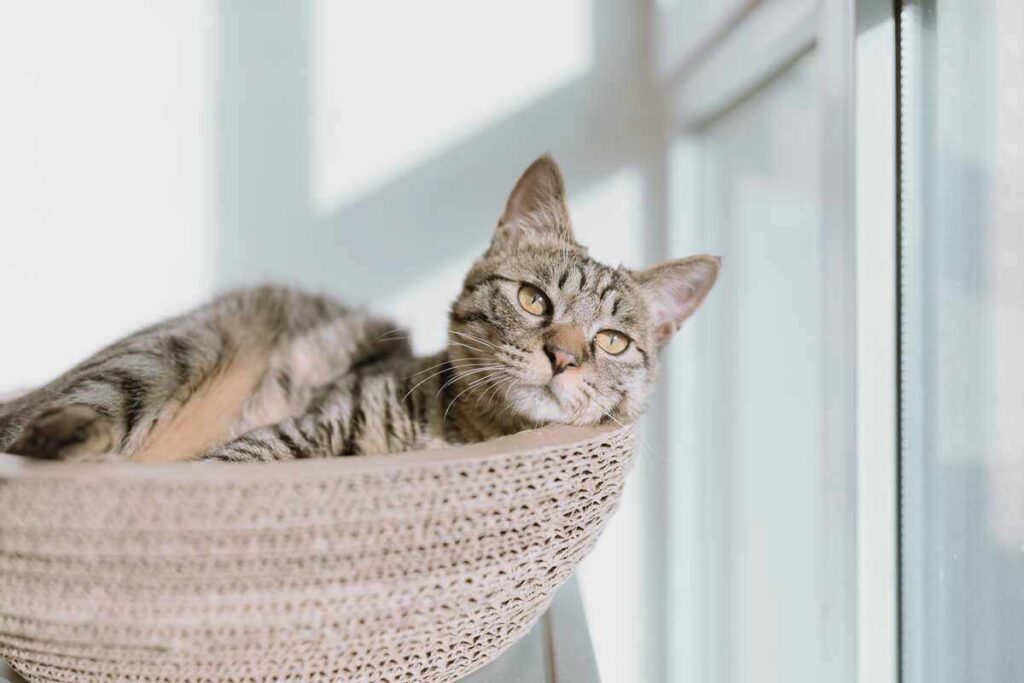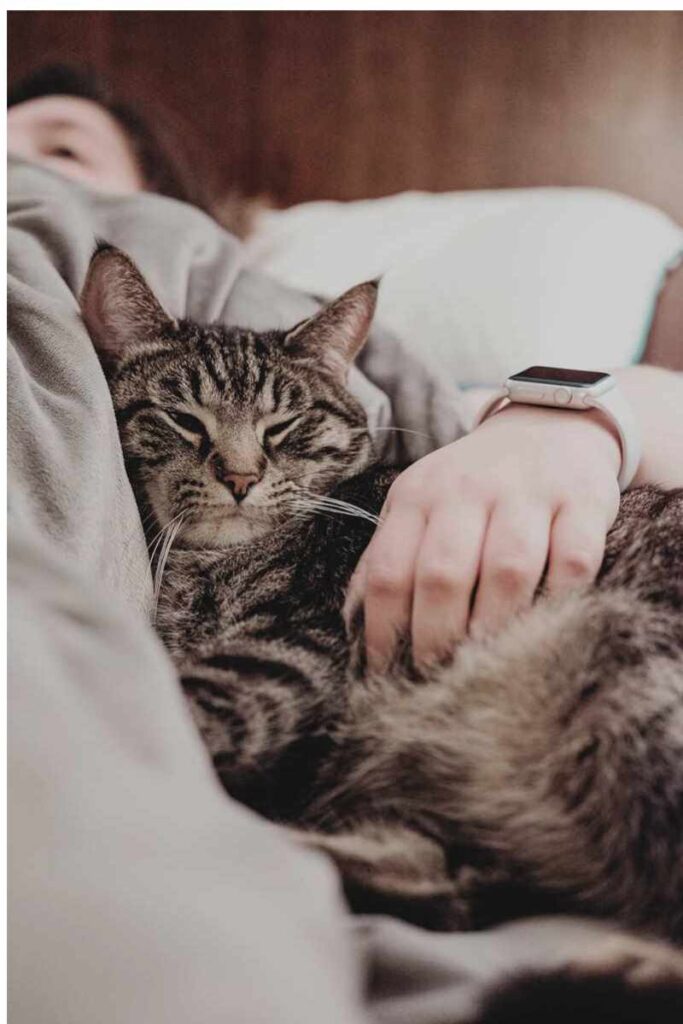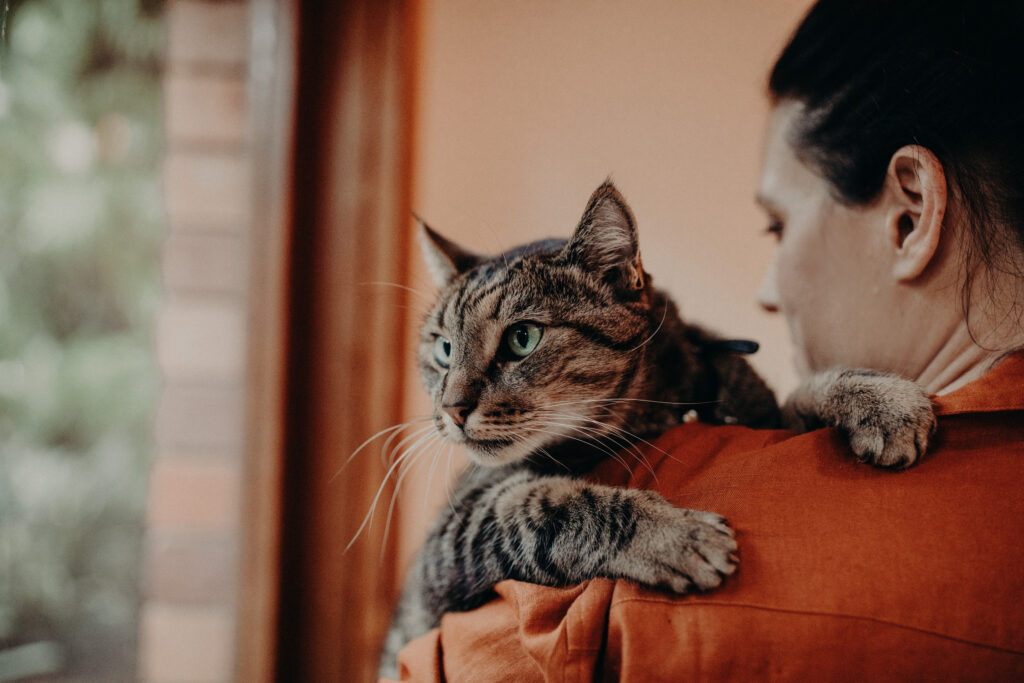
Estimated reading time: 1 minute
August 8 is International Cat Day 2024, and whether you are a new or experienced owner, there’s always something to learn about our feline friends.
From their playful antics to their soothing purrs, cats certainly bring a lot of joy and fun to our lives in countless ways.
But do you know the secrets to keeping your kitty happy, healthy, and purring with contentment?
Keep reading to discover everything you have ever needed to know about cats as pets.
Our guide includes essential cat care tips, feline health and nutrition, and the indoor vs outdoor cat debate.

Why cats make great pets (or leaders, if you ask them)
Anyone who shares their life with cats can describe their captivating (and stubborn) personalities.
Like all pets, cats provide immeasurable loyalty and companionship.
But while they are relatively low maintenance and easy to look after, people still need to do proper research to make sure a cat is the ideal pet for them.
The Cat Protection Society has long been dedicated to the welfare and responsible care of cats.
The organisation stresses the importance of understanding our feline friends’ unique need and providing them with a loving and safe environment.

Cat Protection Society urge owners to know essential cat care tips
Cats can live for well over a decade, and whether you’re an experienced or first-time pet owner, the bond formed with a feline companion is a rewarding and cherished experience.
Kristina Vesk, CEO of The Cat Protection Society, says cat ownership is a whole lot easier, and more enjoyable, when owners know the essentials of cat care.
“Cats are amazing pets that can offer a unique blend of independence, affection, and a lot of entertainment,” says Kristina.
“It’s no secret that many people treat feline family members like their babies.
“But knowing how to properly care for a cat is key to a long and wonderful companionship.
“While raising any animal isn’t always easy, it is very rewarding.”
Kristina says that caring for cats involves a combination of love, attention, and a commitment to their well-being.
“Each cat is unique, so observe and adapt your care routine to suit their individual preferences and requirements,” says Kristina.
“By providing a safe and stimulating environment, maintaining their health, and nurturing their emotional needs, you can ensure a long and fulfilling life for your feline friend.”
“While raising a kitten can leave you feeling like you’ve got a newborn in your house, with a few hints and tips, you’ll be raising your cat to be a good citizen in no time!”
Why cats make great pets
Calming companionship
Cats are masters of tranquility and calm.
Spending time with them can have a soothing effect on our well-being, providing a sense of peace and relaxation.
Independent nature
One of the unique qualities that make cats great pets is their independence.
They appreciate their personal space and can entertain themselves with their curiosity and playfulness.
This characteristic makes them suitable for individuals with busy lifestyles or those who prefer a more low-maintenance pet.
Limited space needed
Cats are adaptable creatures, perfectly suited for various living situations.
Whether you live in a house or an apartment, cats can thrive in smaller spaces without compromising their happiness.
They can make themselves at home nook, and they can turn any nook or cranny into their favourite spot.
Professional self-groomers
Cats keep themselves impeccably clean with their obsessive cleaning habits.
Their innate ability to groom helps minimize the need for frequent baths.
Additionally, their grooming rituals contribute to reduced shedding and allergens.
Entertaining personalities
Cats possess a natural flair for entertainment.
They showcase their acrobatic abilities, chase imaginary prey, and surprise us with their mischievous antics.
Their playful and curious nature provides endless amusement and brings laughter into our lives.
Lifelong companion
While cats may be independent, they form deep and meaningful connections with their human companions.
When a cat chooses to show affection, it’s a genuine display of trust and love.
From gentle head bumps to warm snuggles, these moments create a strong bond and a sense of companionship.
Health benefits
Interacting with cats can have a positive impact on our health.
Studies have shown that their purring vibrations can have a calming effect, lower blood pressure, and reduce stress levels.
Also, the presence of a cat has been linked to improved mental well-being, offering companionship and emotional support.
Low maintenance toilet habits
Cats are naturally inclined to use a litter box, which makes them convenient pets in terms of maintaining cleanliness.
With proper litter box training and regular cleaning, managing their waste becomes a simple and hassle-free task.

Essential cat care tips for every owner
While every cat is different and have their own unique needs, there’s some simple, yet very effective cat care tips, that every owner should be incorporating into their care plan. Such as:
Establish a routine
Whether you have a kitten or have adopted a middle-aged cat, they need to follow your routine.
Kristina says regular mealtimes, play sessions and bedtimes are vital if you value your sleep!
“Keeping a routine will give your cat confidence and make them feel secure, ensuring good habits for life,” says Kristina.
“For active felines, a strategy to ensure they follow your sleep schedule is to have some playtime before bed and leave a food puzzle (like a treat ball with biscuits or a lick mat) that they can play with overnight.
“Just remember, don’t give in to the 3am snack or games request unless you want to be woken at 3am every morning!”
Set a strict cat curfew
Curfews aren’t just for rebellious teenagers, according to Kristina they work great for cats too!
“Ideally, cats should be kept inside or safely confined to your own property (such as cat proof fencing), but if you do let them out, they should always be indoors from dusk until after dawn, as this is when native wildlife is most active.
“Cats are at risk during the night from cars, predatory animals and other cats, so implementing a lock in time will help ease your mind and keep your feline family member safe,” says Kristina.
Train your cat to be a good citizen!
Now training your cat might seem a little silly but teaching them boundaries from the moment they enter your home is very important.
This doesn’t mean you will be teaching your cat to sit, shake or roll over.
It means your cat will learn good habits such as not jumping on your kitchen bench, scratching expensive furniture, or knocking a glass of water off the coffee table while you watch from a distance.
“It is important to remember that animals respond to positive reinforcement and repetition, so make sure to always use an encouraging tone,” says Kristina.
Create a grooming routine
Although cats groom themselves regularly, it is important to brush your cat to keep their coat in good condition and to prevent hairballs.
Grooming is a great way you can care for your cat that helps you to build a bond and remember to target the hard to reach places that your cat might not be able to get to regularly.
Flea, tick, and skin care
You should always make sure your cat is up to date with flea and tick treatments all year round.
Cat owners should also consider how much sun your cat is getting, as cats with light pigmentation are especially prone to skin cancer. So, always keep your cat inside during the hottest parts of the day.
Read our post about an all-in-one new treatment making life easier for cat parents!
Importance of desexing cats
Desexing is perhaps the most important tip for caring for your cat.
No pet owner wants to discover their fur baby is having an unwanted litter of kittens.
“Cats can be desexed from as young as eight weeks and this will prevent unwanted kittens as well as numerous diseases.
“This is the time to find your new cat’s vet, who will also advise on vaccinations and lifelong care,” says Kristina.
The indoor vs outdoor cat debate: which side are you on?
The question of whether cats should be kept indoors or allowed outdoors is a heavily debated topic.
While many owners advocate for allowing their cat the freedom to roam, the other side of the debate cites pet safety and impact on local wildlife as reasons to keep them inside.
While indoor cats are generally safer and less likely to encounter dangers, outdoor cats benefit from more natural stimulation and exercise.
The decision to keep your cat indoors or allow them outdoor access is a personal one, and we are sharing both sides’ reasons for their choice.
Leave a comment to let us know which side you’re on!
Reasons why cats should stay indoors
Keeping your cat indoors has multiple significant benefits to their overall well-being, along with your peace of mind.
One of the primary advantages is safety.
Indoor cats are protected from various external threats such as traffic accidents, aggressive animals, and potential abuse from ill-intentioned individuals.
Additionally, indoor environments reduce the risk of exposure to diseases and parasites that are more prevalent outdoors.
Though, we’ve recently shown how being indoor does not provide significant additional protection against parasites.
Another key benefit to keeping cats indoors is the reduction of anxiety for both the cat and the owner.
Indoor cats are less likely to experience the stress of territorial disputes or the dangers of getting lost.

For owners, it’s comforting knowing exactly where your cat is, eliminating the worry of them not returning home or getting into dangerous situations.
This can be especially important in areas with high traffic or predatory wildlife.
Moreover, indoor cats often enjoy a longer lifespan due to these reduced risks.
By providing a stimulating indoor environment with toys, climbing structures, and interactive play, you can ensure your cat has a fulfilling life while staying safe within the confines of your home.
Why cats should be allowed to roam outside
Allowing cats to venture outdoors can offer them a range of benefits that cater to their natural instincts and contribute to their overall quality of life.
One of the primary advantages is the opportunity for physical exercise.
Outdoor environments provide cats with a vast and varied landscape to explore, climb, and hunt, which can be crucial for maintaining their physical health and agility.
Another significant benefit is mental stimulation.

The outdoors is a sensory-rich environment filled with different sights, sounds, and smells.
This variety can be incredibly stimulating for a cat’s mind, helping to keep them alert and engaged.
It can also aid in reducing behavioural issues that stem from boredom or lack of stimulation.
Furthermore, being outdoors allows cats to exhibit natural behaviors such as scratching, climbing, and exploring territories.
These are all essential aspects of their instinctual needs.
This can lead to a more content and fulfilled cat, as they are able to express their innate behaviours freely.
However, it’s important to weigh these benefits against potential risks and consider factors like local wildlife, traffic, and neighbourhood safety.
Natural predators: how to protect wildlife from cats
However, the impact of cats on wildlife, particularly in Australia, is a significant concern.
Cats are natural hunters and can have a detrimental effect on local wildlife, especially native bird and mammal populations.
Many conservationists advocate for keeping cats indoors to protect these vulnerable species.
Wildlife rescue organisation, WIRES, says “domestic cats pose a serious threat to wildlife because of their natural hunting instincts.”
“Domestic cats take a broad range of prey, with small mammals, birds, and human-derived foods forming the bulk of their diet.
“It’s important to manage domestic pets to minimise the damage that can be done to other more vulnerable species.”
There are currently government programs in place across the country to reduce the number of unowned cats.
Additionally, in some parts of Australia, there are specific regulations and laws about allowing cats outdoors, primarily to protect wildlife.
It’s important for cat owners to be aware of and comply with these local regulations, ensuring both the safety of their pets and the protection of the environment.
WIRES’ tips to protect wildlife from cats
- Keep your cat inside, at least at night when native animals are most active.
- If possible, keep dogs inside at night or confined to a secure space when native animals are most active.
- Provide sufficient food and shelter for your pets
- Build a cat enclosure in your yard to allow your cat to have outdoor time without risks.
- Provide a safe environment for wildlife in your garden by having separate areas for pets e.g. a fully enclosed cat run.
- Identify your pet with a collar, tag and microchip and add collar bells for cats
- De-sex your pets to prevent unwanted litters

INTERNATIONAL CAT DAY: 10 fascinating feline facts!
Whisker wonders: Cats use their whiskers to detect if they can fit through a space.
Night owls: Cats are crepuscular, which means they’re most active during the dawn and dusk.
Unique prints: Just like human fingerprints, no two cats’ nose prints are alike.
Ancient companions: Cats were domesticated over 4,000 years ago in ancient Egypt.
Purring mysteries: Cats purr for various reasons, including relaxation, healing, and even distress.
Grumpy faces: Some cats have a naturally grumpy expression, but it doesn’t always mean they’re in a bad mood!
High jumpers: Cats can jump up to six times their body length in one jump.
Taste buds: Cats lack taste receptors for sweetness. So, no candy for kitties!

How to care for older cats: senior cat care tips
Cats have different needs as they age, so a tailored senior cat care plan is vital for all ageing cats.
Nerida Atkin from the Cat Protection Society says owners must understand that as cats get older their needs change.
“It’s a lot like us humans ageing,” says Nerida.
“Eyesight, hearing, and body condition start to deteriorate, as do things like kidney and liver function.
“Cats can also get arthritis so they may not be able to use their litter tray the same or jump up on things like before.
“Some older cats can also become sensitive to touch so may need short bursts of patting and grooming instead of all at once.
“Your cat will tell you if this is happening, so make sure you read their signals.”

Cat Protection Society’s senior cat care plan tips
The Cat Protection Society recommends the following tips be included in every senior cat care plan:
- Increase vet visits to six-monthly health checks.
- Older cats have different nutritional needs, so make sure to get age-appropriate food.
- Large kitty litter trays are great for those who find it hard to crouch down due to arthritis.
- Consider putting a ramp to the lounge or bed if they have trouble jumping.
- Ensure their food and water is in a low easy to reach spot that doesn’t require jumping.
- Many cats love drinking from the running tap; instead consider a water fountain bowl like this one – that way, they can have the flowing water they love but without needing to jump up.
- While adjustments need to be made, don’t change their routine. Cats are creatures of habit and change causes stress.
- Older cats still like to play, so continue engaging with toys and playing teaser-type games.
- A heat pad in their bed at night can provide extra comfort for sore joints.

About the Cat Protection Society
The Cat Protection Society was established by a small group of passionate animal lovers in the 1950s.
Today, it operates a no-kill shelter in Newtown, with the mission that every cat has a loving and responsible home.

COMMENTS ( 3 )